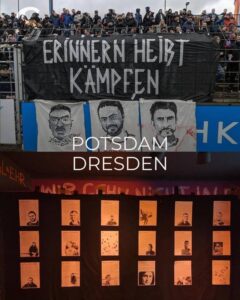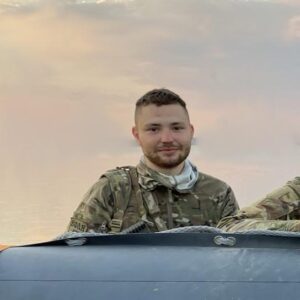 This is a translation of an article dedicated to the martyr Vladislav Yurchenko, commemorating the anniversary of his death. The translation was done by our friends, and we thank them for this solidarity effort!
This is a translation of an article dedicated to the martyr Vladislav Yurchenko, commemorating the anniversary of his death. The translation was done by our friends, and we thank them for this solidarity effort!
Martyrs do not die! Şehîd namirin!
Today marks exactly one year since our comrade, anarchist and internationalist Vladislav Yurchenko (“Pirate”), heroically died in battle on the Kinburn Spit in the Mykolaiv region. On the night of August 9, fighters from the Main Intelligence Directorate of Ukraine, including the “Siberian Battalion,” in which Vladislav fought, landed on the Kinburn Spit.
Pirate” was wounded in a gunfight with Russian paratroopers, and later, during the evacuation, the boat carrying our comrade was hit by an anti-tank guided missile system. Besides Vladislav, six other fighters from the “Siberian Battalion” died on the Kinburn Spit — the overwhelming majority of the Siberian battalion members who participated in the landing.
Vladislav was 22 years old when he was killed. He arrived in Ukraine through the “Siberian Battalion” in February 2024. By May, he was already participating in the defense of the Kharkiv region. On August 9, he became a martyr on the Kinburn Spit. A short but heroic combat path. Alongside combat operations and exhausting training, he also engaged in ideological discussions with comrades, studying revolutionary theory and the experience of the Kurdish Revolutionary Movement, and planned organizational work. The young hero Vladislav Yurchenko, who came to Ukraine to oppose Russian fascism and colonialism, as well as to organize with comrades into a united force, is a testament to the relevance and correctness of the revolutionary line of the Combat Organization of Anarcho-Communists, which we have followed since the beginning of the full-scale war.
“Pirate” became politicized in conditions where anarchist organizations in Russia were experiencing a crisis due to repression. He was born in the Amur region. He grew up without parents, studied, and was raised in a Suvorov military school. He later lived in Kaliningrad and worked on sea vessels. Even in the Siberian Battalion, despite his short height, he was distinguished by excellent physical fitness, was extremely resilient, ran well, and was generally well adapted to the harsh combat environment. As for his political development, after starting to take an interest in protest activities, he was not immediately drawn to anarchism. As is now known from official Russian media that reported on his death, for some time he sent money to the FBK (Anti-Corruption Foundation founded by Navalny). But he became increasingly interested in anarchist ideas. The struggle of anarchists, especially the Combat Organization of Anarcho-Communists, after the start of the full-scale Russian invasion of Ukraine, pushed him to take practical steps. Anarchists declared themselves as an active force both in partisan attacks on Russian territory and in resisting Russian imperialism within Ukraine itself. The example of martyr Dmitry Petrov, a Russian anarchist and one of the founders of the Combat Organization of Anarcho-Communists, who created an anarchist unit and died near Bakhmut on April 19, 2023, resonated strongly with the young revolutionary’s soul. Therefore, he decided to go to Ukraine and chose a unit accepting Russian citizens, where it was possible to openly declare anarchist ideas at that time — that unit was the “Siberian Battalion.” He hoped there would be an opportunity to conduct anarchist organizational activities within this military structure.
As mentioned, the comrade arrived in Ukraine at the end of February 2024. Training commenced immediately under harsh conditions. In the breaks between training sessions, he read the works of Pyotr Kropotkin and took notes on the most important points. Upon learning that the author of this article had a book published with the participation of Dima Petrov titled “Flowers of the Desert: 10 Years of Revolution in Rojava,” he immediately expressed a desire to read it. At the beginning of March, the book was delivered.
Later, the only material assistance he requested from volunteers from the “Solidarity Collectives” was to find for him the memoirs of one of the founders of the Kurdistan Workers’ Party, Sakine Cansız, titled “Sara. My Whole Life Was a Struggle,” published with the help of Dmitry Petrov. When the book was found, the comrade was already in southern Ukraine, where he soon became a martyr…
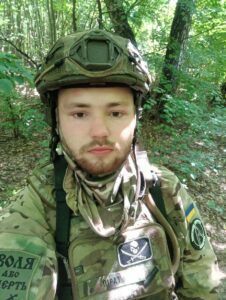
In the spring of 2024, the comrade underwent intense training — he was an assault soldier and a special forces fighter. Then, in early May, he was deployed to the Kharkiv region to defend it against the impending Russian invasion. On May 10, the group from the “Siberian Battalion”, which included “Pirate”, was one of the first to encounter Russian elite units at the border and repelled their initial attack in close-quarters combat. Three months later, these volunteers would die on the Kinburn Spit.
May passed for “Pirate” in Volchansk and its surroundings — he and other fighters defended this city from the advancing occupiers. When the comrade returned to Kyiv, the author of this article was still in the hospital after being wounded. However, we had the opportunity to spend more time in ideological discussions and casual conversations. Vladislav shared some details of his life in Russia, showing videos of himself engaging in rope jumping before the war — jumping with a rope from bridges and sheer cliffs. We talked a lot about how to combine participation in our unit with broader revolutionary work in Ukraine and beyond. We discussed how we understand war and self-defense — and agreed with the concept, originally formulated by the Kurdish Revolutionary Movement, that war should be understood not only as direct armed confrontation with enemies but also as everyday ideological and practical resistance to patriarchy, capitalism, nationalism, consumerist attitudes towards nature, and the mentality and hierarchies imposed by these phenomena. In June, we, along with other comrades, attended the “Solidarity Collectives” conference. The conference, which gathered many participants from various initiatives, became a source of inspiration for us and demonstrated the readiness of comrades in Ukraine to support the struggle on the front lines while also developing structures for further resistance to capitalism and the state on both local and global scales.
The comrade also contributed to anarchist agitation work — the “Siberian Battalion” published his address, which also appeared on the media resources of the Combat Organization of Anarcho-Communists and the “Resistance Committee”, as well as on media resources close to the Kurdish Revolutionary Movement. The content of this message was coordinated with the command of the “Siberian Battalion”, and therefore some ideological formulations were omitted. The focus was also partially shifted to somewhat strange aspects from an anarchist perspective — for example, the leadership was very keen for the comrade to state that he had a good salary in Russia, and accordingly, that he “had something to lose” when he went to Ukraine. The excessive focus on these “material” details reveals the values of the command, which, despite lacking the relevant competence, obtained leadership positions in the military-political project. However, for the sake of the comrade’s media work, which could yield results later, this compromise seemed acceptable. Let’s quote this address once again:
“I have always had a keen sense of justice. That is why, when Putin started an imperial war against Ukraine, I decided to fight with arms in my hands for the freedom of the Ukrainian people, for the freedom of citizens of the Russian Federation and indigenous peoples enslaved by Russia.
At the age of 24, I became interested in the ideals of anarchism and then I realized that I was living in a fascist state, I began going to rallies in support of political prisoners, and very quickly became disillusioned with this method of fighting the regime. I studied as a naval specialist, worked on naval vessels, I had a good salary, I had something to lose, but when the war began, my conscience did not allow me to continue leading my normal life and turn a blind eye to the crimes that the Russian army was committing. That’s why I’m here.”
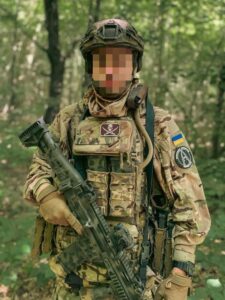
In the middle of summer, the comrade, along with a group of capable Siberian Battalion fighters, headed south. Everyone understood what kind of tasks might be at hand, and therefore some were feeling anxious. But for “Pirate”, thoughts of the upcoming difficulties and trials only brought a surge of enthusiasm and calm confidence. Overall, despite the challenges in interacting with the leadership of the “Siberian Battalion,” there was a pleasant and friendly atmosphere at the grassroots level within the collective. The comrade believed in the guys, felt responsible for them, and thought that together they would be able to overcome the serious challenges ahead.
To avoid drawing unnecessary attention, the convoy departed at night. When the gear was loaded and the vehicles were ready to go, “Pirate” and the author of this article watched a video on the laptop of the assault by guerrillas of the PKK on a Turkish base in Southern Kurdistan on February 17, 2024. According to the Kurdish Revolutionary Movement, 37 Turkish soldiers and officers were eliminated as a result of this attack. One guerrilla named Sherwan Varto became a martyr. As “professional stormtroopers,” we noted the coordination and effectiveness of the guerrillas’ actions, as well as how, with extremely limited resources, they managed to inflict defeats on the second most powerful army of the imperialist militaristic alliance NATO. This was the last thing we managed to discuss face-to-face, although we spoke a few more times afterward. Soon, “Pirate” and the other fighters got into their vehicles. The author of this article never saw him again.
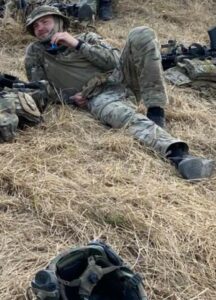
On the morning of August 9, just a few hours after the landing on the Kinburn Spit, news of “Pirate’s” heroic death became known. It was also reported that the overwhelming majority of the “Siberian Battalion” members who participated in the landing perished alongside him. The “Siberian Battalion”, which had never been numerous, effectively ceased to exist for a time. These were young, honest, and sincere volunteers. Except for our comrade, the names of the other fallen fighters were virtually forgotten by the battalion’s leadership — none of them were honored with an obituary or any remembrances. But for us, martyrs do not die, and therefore we spoke and will continue to speak about our comrade Vladislav Yurchenko.
How should we conclude this memorial text for the comrade? The anarchist unit in Ukraine that martyrs Dmitry Petrov and Vladislav Yurchenko dreamed of and tried to create was never formed. They, acting under extremely difficult conditions, made every effort for this and died on this path. Their struggle should serve as an example for new revolutionaries — we would like to preserve the memory of it forever. The lessons learned in Ukraine will surely be useful to us in new battles, the time for which will inevitably come.
Martyrs do not die!
In conclusion — a posthumous address from Vladislav Yurchenko, “Pirate,” which he personally entrusted to the author of this article for publication on the media resources of the Combat Organization of Anarcho-Communists in the event of his death:
Greetings to all our comrades.
My name is Vladislav, nom de guerre “Pirate”. I decided to leave this letter in the event of my death in the war against the Russian imperial regime, the war against the state in which I was born and raised, the war against the dictator who usurped power yet before my birth.
I want this letter to remain as a historical document about the participation of anarchists-revolutionaries in the resistance of the Ukrainian people against the Russian tyranny.
I, like all sane citizens of the Russian Federation, was shocked by the beginning of this war, terrible injustice, and crimes committed by the Russian army in Ukraine. From the first days of the full-scale invasion, I only thought about what I could do against this injustice, how I can stop the madness that my people made. When I got to know about the emergence of military units in the Armed Forces of Ukraine, in which the citizens of the Russian Federation were accepted, I immediately realized that I had to fight for the freedom of the Ukrainian people and our ideals in this way, with weapons in my hands.
And even if I do not see the victory of the Ukrainian people over the occupiers, the bright future anarchist communism, justice and freedom for all people on Earth, I believe.
I believe that the future will certainly come. While our comrades continue to fight, totalitarianism, authoritarianism and fascism will not capture humanity.
I wish my comrades also not to lose confidence in the struggle for freedom.
Revolution is immortal!
